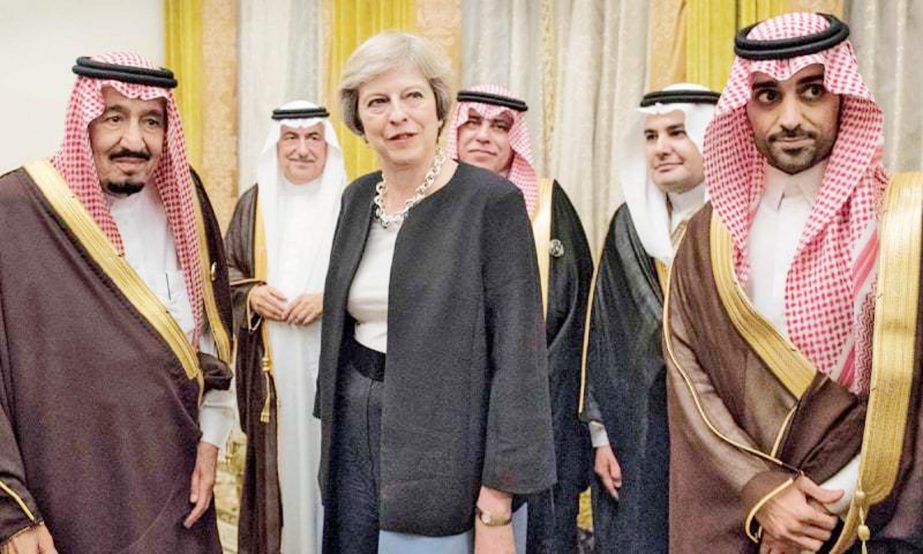
Reuters, London :
British Prime Minister Theresa May said on Wednesday she would deepen defense cooperation with Gulf countries and work with them to push back “against Iran’s aggressive regional actions”.
Addressing the Gulf Cooperation Council, May said Britain wanted to “make a more permanent and more enduring commitment to the long-term security of the Gulf” and invest more than 3 billion pounds in defense spending in the region over the next decade.
“Gulf security is our security,” she told the council, which brings together the leaders of Saudi Arabia, Kuwait, the United Arab Emirates, Qatar, Bahrain and Oman.
Britain will help Gulf states “push back” against aggressive regional actions by Iran, Prime Minister Theresa May told the Gulf Cooperation Council in Bahrain on Wednesday in a televised address.
“We must… continue to confront state actors whose influence fuels instability in the region,” May told Gulf leaders at the summit.
“So I want to assure you that I am clear-eyed about the threat that Iran poses to the Gulf and to the wider Middle East.”
She added: “We must… work together to push back against Iran’s aggressive regional actions.”
May said she wanted a “strategic partnership” to help boost security in Gulf countries, including defence investment and military training in Bahrain and Jordan.
The prime minister also spoke about discussions to improve trade ties with Gulf countries as Britain prepares to leave the European Union.
“I want these talks to pave the way for an ambitious trade arrangement” after Brexit, she said.
King Salman of Gulf heavyweight Saudi Arabia opened the summit on Tuesday with a call for a “doubling of efforts” to face regional challenges.
In October last year, Britain began building a naval base at Mina Salman, outside Manama, its first new permanent base in the Middle East in four decades.
The GCC bloc of Western-allied countries includes Bahrain, Kuwait, Oman, Qatar, Saudi Arabia and the United Arab Emirates.
French President Francois Hollande was the first leader from outside the region to attend a GCC summit, in May 2015. US President Barack Obama met with the bloc in Saudi Arabia in April of this year.May’s two-day visit comes as her government faces mounting domestic criticism that it has not done enough to avoid post-Brexit disruption to British trade, which is currently carried out under EU agreements.
British Prime Minister Theresa May said on Wednesday she would deepen defense cooperation with Gulf countries and work with them to push back “against Iran’s aggressive regional actions”.
Addressing the Gulf Cooperation Council, May said Britain wanted to “make a more permanent and more enduring commitment to the long-term security of the Gulf” and invest more than 3 billion pounds in defense spending in the region over the next decade.
“Gulf security is our security,” she told the council, which brings together the leaders of Saudi Arabia, Kuwait, the United Arab Emirates, Qatar, Bahrain and Oman.
Britain will help Gulf states “push back” against aggressive regional actions by Iran, Prime Minister Theresa May told the Gulf Cooperation Council in Bahrain on Wednesday in a televised address.
“We must… continue to confront state actors whose influence fuels instability in the region,” May told Gulf leaders at the summit.
“So I want to assure you that I am clear-eyed about the threat that Iran poses to the Gulf and to the wider Middle East.”
She added: “We must… work together to push back against Iran’s aggressive regional actions.”
May said she wanted a “strategic partnership” to help boost security in Gulf countries, including defence investment and military training in Bahrain and Jordan.
The prime minister also spoke about discussions to improve trade ties with Gulf countries as Britain prepares to leave the European Union.
“I want these talks to pave the way for an ambitious trade arrangement” after Brexit, she said.
King Salman of Gulf heavyweight Saudi Arabia opened the summit on Tuesday with a call for a “doubling of efforts” to face regional challenges.
In October last year, Britain began building a naval base at Mina Salman, outside Manama, its first new permanent base in the Middle East in four decades.
The GCC bloc of Western-allied countries includes Bahrain, Kuwait, Oman, Qatar, Saudi Arabia and the United Arab Emirates.
French President Francois Hollande was the first leader from outside the region to attend a GCC summit, in May 2015. US President Barack Obama met with the bloc in Saudi Arabia in April of this year.May’s two-day visit comes as her government faces mounting domestic criticism that it has not done enough to avoid post-Brexit disruption to British trade, which is currently carried out under EU agreements.

